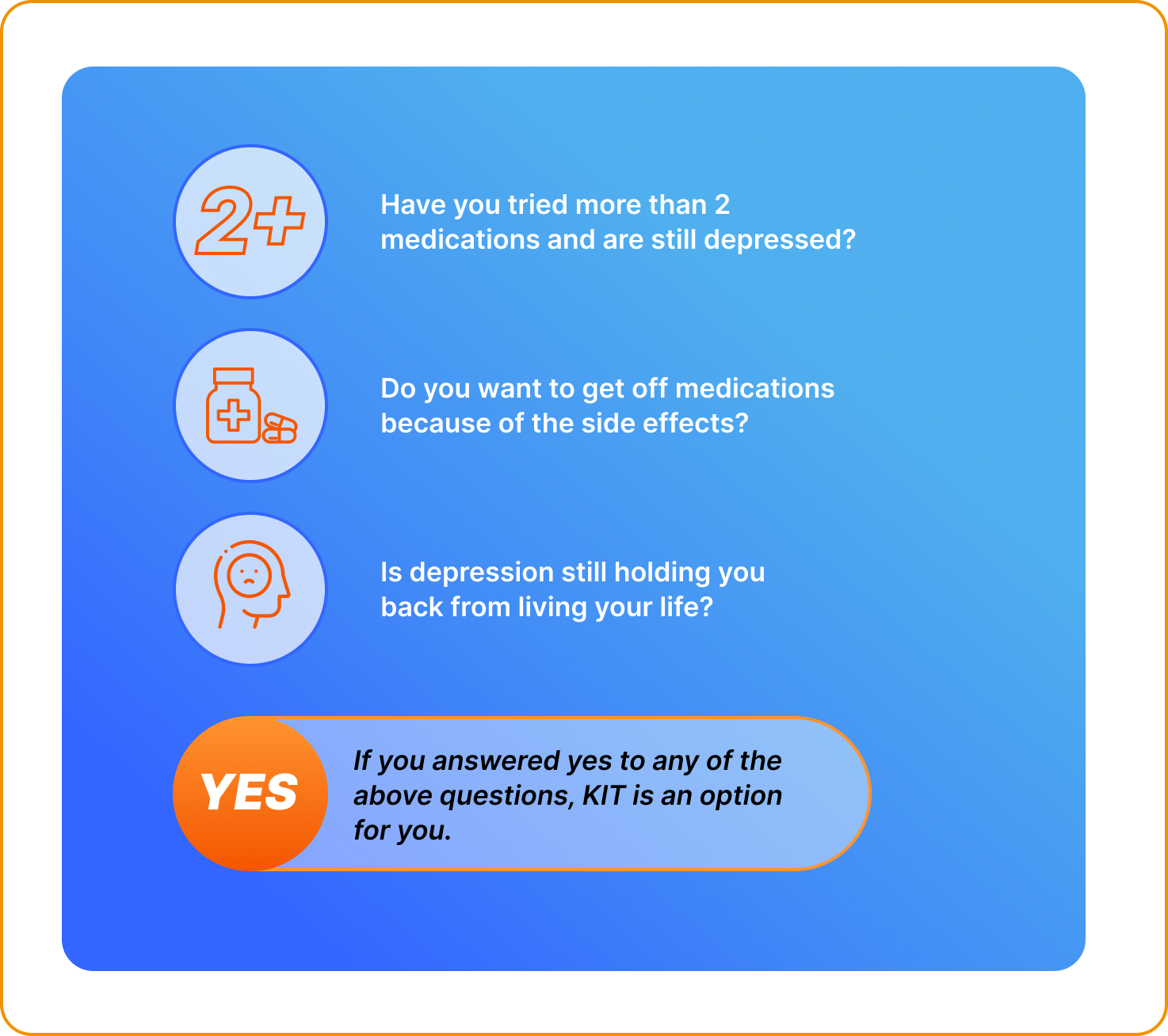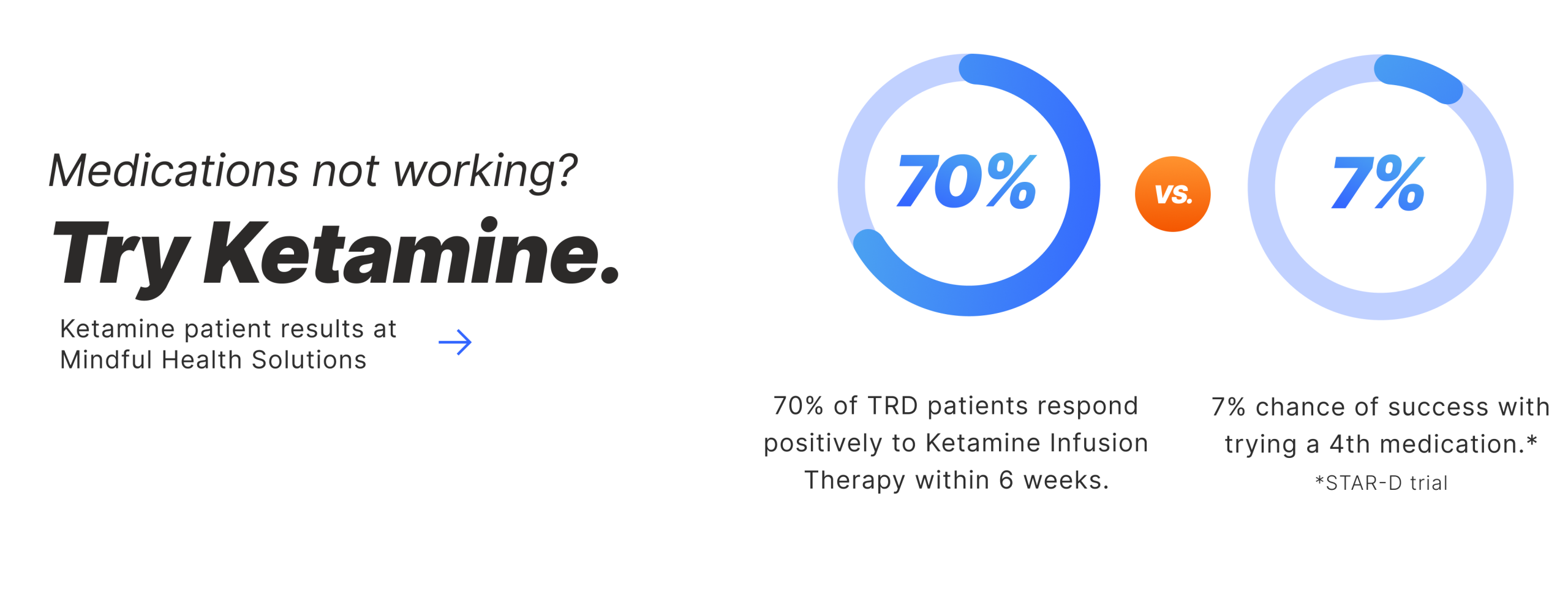
Don’t Lose Hope
Ketamine Infusion Therapy Helps You When You Need It Most
Ketamine infusion therapy is an intravenous treatment effective for patients struggling with a variety of mental health conditions, including treatment-resistant depression (TRD), anxiety disorders, post-traumatic stress disorder (PTSD), obsessive-compulsive disorder (OCD), and suicidal ideation. This therapy may be a potential treatment option for those not finding relief from other treatments such as medications, TMS, or psychotherapy.
Ketamine works by blocking NMDA receptors, leading to a rapid increase in glutamate within the brain. This increase strengthens and restores neural connections in the brain regions most affected by depression. As a result, patients experience positive changes in brain circuit function and improved mood regulation.
Trusted Experts in Ketamine Infusion Therapy
Mindful Health Solutions specializes in cutting-edge treatments, including Ketamine Infusion Therapy for treatment-resistant depression. Led by Chief Medical Officer Dr. Toby Marton and Associate Chief of Training and Innovation Dr. Alvin Lau, our team has extensive experience and expertise, transforming hundreds of lives and publishing research in top medical journals.
We provide ketamine infusion treatments in a relaxed outpatient setting, ensuring safety and minimal side effects. Our goal is to help you find relief from the debilitating symptoms of depression, rediscover joy, and improve your quality of life. Trust us for safe, effective ketamine therapy on your journey to mental wellness.

A Note on Drug Abuse
Ketamine is also a drug of abuse. It’s known as “Special K” on the streets and it’s the number one club drug in some Asian countries. Although it’s not common for patients receiving controlled ketamine administrations for the treatment of depression to turn into ketamine abusers, we have to be careful about regulating the drug so that it doesn’t end up in the hands of people who don’t need it.
We are in-network with Kaiser, Medicare, and all major commercial insurance plans.
What does a ketamine therapy session look like?
IV ketamine therapy is an office-based, outpatient procedure. The ketamine infusion lasts 40 minutes and the entire session takes about 90 minutes to complete. The session process will begin by getting you situated in a comfortable chair. Then, your clinician will inform you when the IV has started.
The first thing you will feel is a sense of relaxation of mind and/or body. You may then begin to feel slightly light or light-headed. Some people report a sense of feeling a slight warmth. Eventually, you may feel even lighter, almost a slight separation between yourself and your body. Your hands and legs may feel far away. Some people progressively feel more separation between themselves and the different components of consciousness (e.g., their thoughts, feelings, bodily sensations, and perception). Occasionally, people continue to progressively experience an even greater physical sensation of lightness – sometimes to the point of feeling above the room. Patients generally tolerate these sensations very well, reporting the experience as “spiritual” or “pleasurable.”
If someone is struggling with depression, anxiety, or rumination, this point is when they feel much less of and/or distant from these feelings. This experience is frequently described as an immense relief – like the blanket of depression has been temporarily lifted. This experience can also serve as a very hopeful reminder to patients that depression or anxiety does not define them. These conditions are separate from them, and as such, they can be temporary.
In rare cases, patients may have a more negative experience after receiving a ketamine intravenous injection. We have psychiatric professionals on-site to help manage these rare events, which are generally brief and usually resolve completely within 10-15 minutes after stopping the infusion.
How do you feel during treatment?
Ketamine infusions are often described as an “out-of-body experience.” Patients may experience dissociation, often reported as a pleasant feeling that relieves symptoms of depression. Dissociation can include:
- Feeling detached from your body
- Having a distorted perception of time and space
- Experiencing altered perceptions and sensations
- Entering a dream-like state where thoughts may become distorted
- Emotional detachment
Some individuals describe a sense of mental clarity or expanded consciousness.

